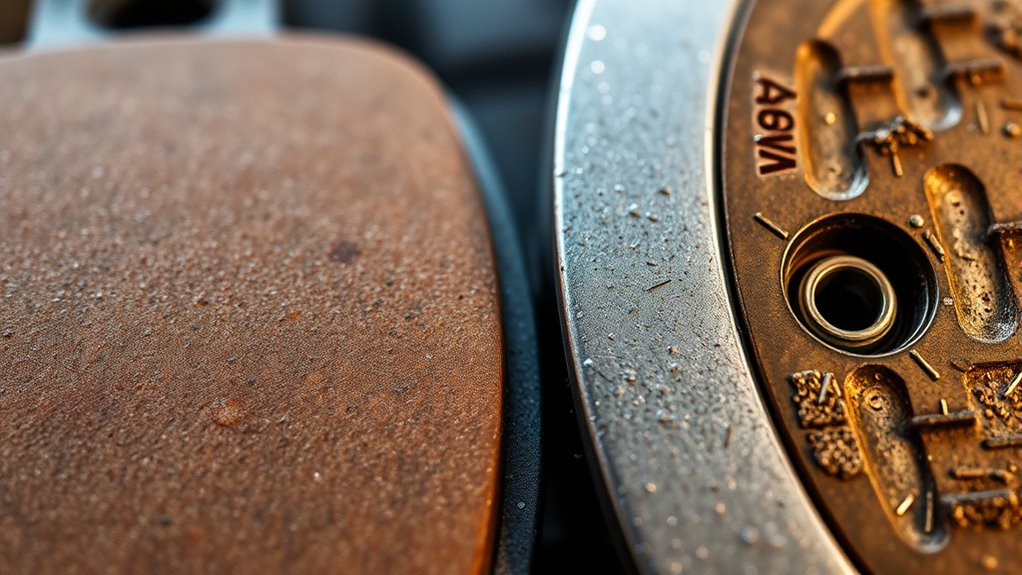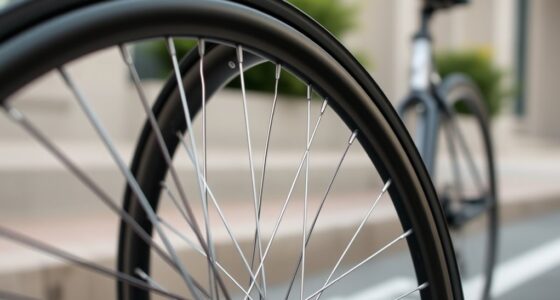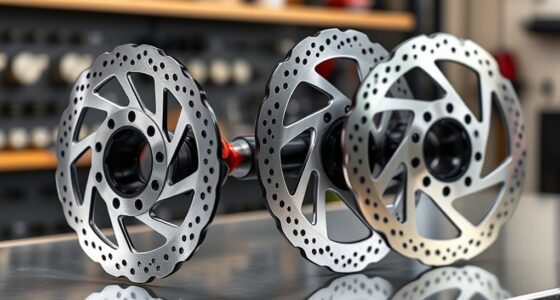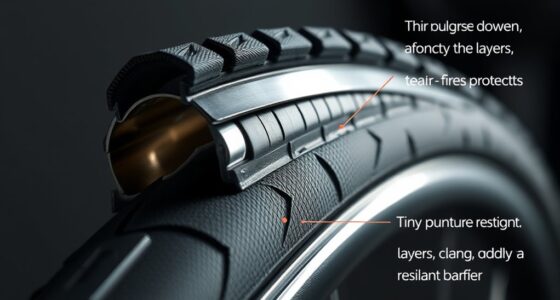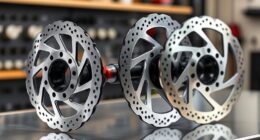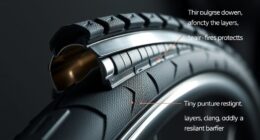If you’re choosing between resin and metallic brake pads, consider your driving needs. Resin pads are quieter and ideal for everyday city driving, but they wear out faster and can soften under high heat. Metallic pads last longer, handle high temperatures well, and are better suited for performance or heavy-duty use, but they tend to produce more noise. To understand which compound suits your vehicle best, explore how each performs across different conditions.
Key Takeaways
- Resin brake pads are softer, quieter, and ideal for everyday urban driving, but wear out faster than metallic pads.
- Metallic brake pads are more durable, heat-resistant, and suitable for high-performance or heavy-duty applications.
- Resin pads perform well at lower temperatures but can fade under aggressive braking, unlike metallic pads.
- Metallic pads tend to produce more noise, such as squealing, especially during cold or heavy use.
- Material choice depends on balancing factors like noise preference, longevity, thermal performance, and driving conditions.
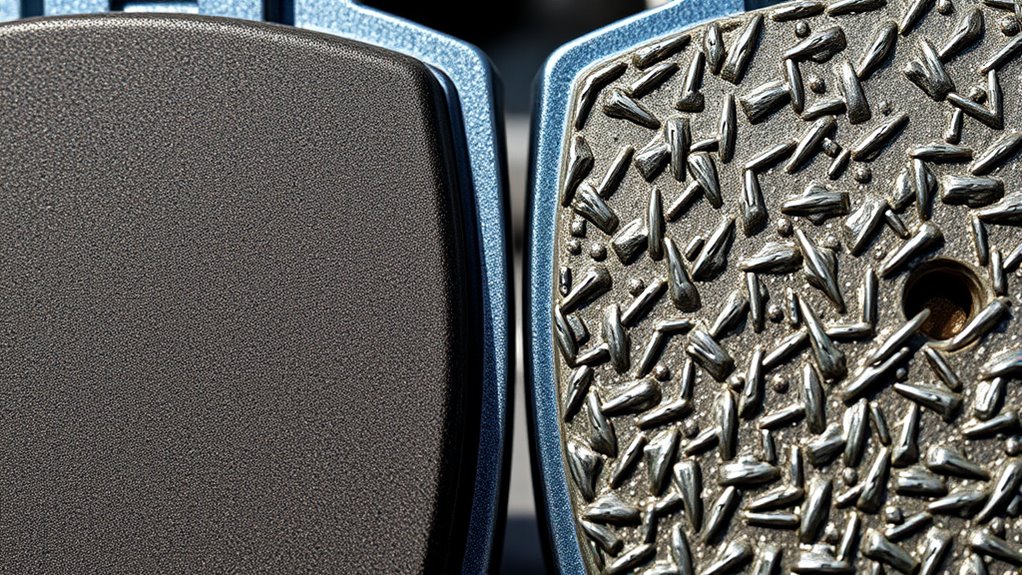
Brake pad compounds are essential for ensuring safe and effective braking performance in your vehicle. When choosing between resin and metallic brake pads, understanding their material durability and noise performance can help you make the right decision. Material durability refers to how well the brake pads withstand the wear and tear of regular use. Resin, or organic, brake pads are made from softer materials like rubber, glass, and Kevlar, which generally wear out faster than metallic pads. They tend to soften over time, especially under high temperatures, leading to quicker degradation. Metallic pads, on the other hand, contain metal fibers such as steel or copper, making them more resistant to heat and wear. This durability means they usually last longer and maintain consistent braking performance over many miles. If you’re looking for longevity and a more resilient brake pad, metallic options might be the better choice.
Noise performance is another critical factor that varies markedly between resin and metallic brake pads. Resin pads are known for their quiet operation. They produce less noise because their softer material absorbs vibrations, resulting in smoother, quieter braking. This makes them ideal for everyday driving in urban environments where noise reduction is appreciated. Conversely, metallic brake pads tend to generate more noise during braking. The metal-to-metal contact produces a squealing or squeaking sound, especially when the brakes are cold or under heavy use. While some drivers find this noise annoying, enthusiasts often accept it in exchange for the enhanced durability and stopping power that metallic pads offer. Additionally, the manufacturing process of metallic pads can influence their noise levels, with some designs incorporating noise-dampening features.
Temperature tolerance also plays a role in the performance differences. Resin brake pads perform well at lower temperatures but can fade or lose effectiveness during aggressive braking or in high-performance scenarios. Metallic pads excel at higher temperatures, maintaining their stopping power even when the brakes heat up substantially. This makes metallic pads a popular choice for performance cars or heavy-duty vehicles where frequent, intense braking is common.
Frequently Asked Questions
How Do Resin and Metallic Brake Pads Compare in Noise Levels?
Resin brake pads generally produce lower noise levels and sound intensity, making them quieter during operation. Metallic brake pads tend to generate more noise due to their harder materials, which can cause increased sound intensity when braking. If you prioritize a quieter ride, resin pads are usually the better choice. However, if you need enhanced braking performance, metallic pads might be worth the extra noise.
Which Brake Pad Type Offers Better Longevity Under Extreme Conditions?
You’ll find metallic brake pads offer better longevity under extreme conditions because they have higher abrasion resistance and superior wear characteristics. Their durability withstands intense heat and heavy use, making them ideal for demanding driving environments like towing or racing. Resin pads, while quieter and softer, tend to wear faster and may not hold up as well in extreme conditions. So, if longevity is your priority, metallic pads are the better choice.
Are Resin Brake Pads More Environmentally Friendly Than Metallic Ones?
Resin brake pads are more environmentally friendly than metallic ones, like a gentle stream compared to a rushing river. They produce less dust and harmful emissions, reducing environmental impact. Plus, resin pads are generally more recyclable, making them a better choice for eco-conscious drivers. Their softer composition means they’re kinder to the planet, helping you reduce your carbon footprint without sacrificing braking performance.
How Does Climate Affect the Performance of Resin Versus Metallic Brake Pads?
Climate effects notably influence the performance of resin and metallic brake pads. Hot, humid conditions can diminish resin brake pad durability, causing them to wear faster and fade quicker. In contrast, metallic pads handle temperature fluctuations better, maintaining consistent braking power. You’ll find metallic pads more dependable in extreme climates, while resin pads excel in milder weather. Always consider climate effects when choosing brake pads to guarantee ideal performance and longevity.
Can Switching Between Brake Pad Types Impact Vehicle Braking System Components?
Switching between brake pad types can impact your vehicle’s braking system components, especially if brake compatibility isn’t considered. Resin pads tend to be gentler on rotors, reducing wear, while metallic pads offer stronger braking but may cause more wear on rotors. This change can affect brake maintenance needs, potentially leading to more frequent inspections or repairs. Always guarantee your new pads match your vehicle’s specifications to keep your braking system functioning at its best.
Conclusion
Choosing between resin and metallic brake pads is like picking the right tool for a job—you need the perfect fit to keep your ride smooth and safe. Resin pads offer gentle, quiet stops, like a whisper in the night, while metallic pads deliver powerful, aggressive braking, like a thunderclap. Whatever you choose, remember, your brake pads are the unsung heroes behind every safe journey. Treat them well, and they’ll keep you stopping on a dime.
